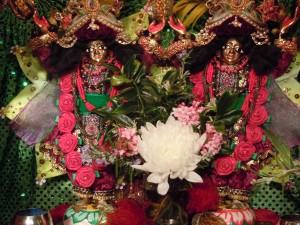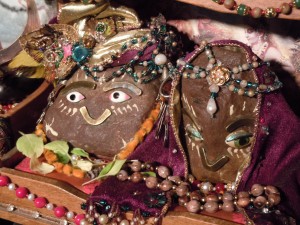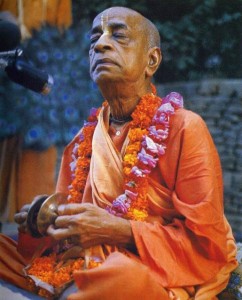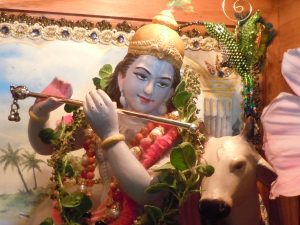Submitted by: Damagosha Dasa
Hare Krsna -what we have below is a somewhat detailed examination of bhakti yoga and karma yoga.Before we become perfect bhakta yogis, we have to perfect at karma yoga.
damaghosa das
—————–
TRANSLATION
When King Parīkṣit asked Śukadeva Gosvāmī about the direct meaning of the material forest, Śukadeva Gosvāmī replied as follows: My dear King, a man belonging to the mercantile community [vaṇik] is always interested in earning money. Sometimes he enters the forest to acquire some cheap commodities like wood and earth and sell them in the city at good prices. Similarly, the conditioned soul, being greedy, enters this material world for some material profit. Gradually he enters the deepest part of the forest, not really knowing how to get out. Having entered the material world, the pure soul becomes conditioned by the material atmosphere, which is created by the external energy under the control of Lord Viṣṇu. Thus the living entity comes under the control of the external energy, daivī māyā. Living independently and bewildered in the forest, he does not attain the association of devotees who are always engaged in the service of the Lord.
….Since the material world is compared herein to a forest, it may be argued that in Kali–yuga modern civilization is mainly situated in the cities. A great city, however, is like a great forest. Actually city life is more dangerous than life in the forest. If one enters an unknown city without friend or shelter, living in that city is more difficult than living in a forest. There are many big cities all over the surface of the globe, and wherever one looks he sees the struggle for existence going on twenty-four hours a day. people rush about in cars going seventy and eighty miles an hour, constantly coming and going, and this sets the scene of the great struggle for existence. One has to rise early in the morning and travel in that car at breakneck speed. There is always the danger of an accident, and one has to take great care. In his automobile, the living entity is full of anxieties, and his struggle is not at all auspicious.
SB 5.14.2
In the forest of material existence, the uncontrolled senses are like plunderers. The conditioned soul may earn some money for the advancement of Kṛṣṇa consciousness, but unfortunately the uncontrolled senses plunder his money through sense gratification. The senses are plunderers because they make one spend his money unnecessarily for seeing, smelling, tasting, touching, hearing, desiring and willing. In this way the conditioned soul is obliged to gratify his senses, and thus all his money is spent. This money is actually acquired for the execution of religious principles, but it is taken away by the plundering senses
…One should understand that the wealth and opportunity one gets in the material world should not be squandered in sense gratification. They are meant for the advancement of Kṛṣṇa consciousness. This Kṛṣṇa consciousness movement is therefore teaching people to control the mind and five knowledge-acquiring senses by a definite process. One should practice a little austerity and not spend money on anything other than the regulative life of devotional service. The senses demand that one see beautiful things; therefore money should be spent for decorating the Deity in the temple. Similarly, the tongue has to taste good food, which should be bought and offered to the Deity. The nose can be utilized in smelling the flowers offered to the Deity, and the hearing can be utilized by listening to the vibration of the Hare Kṛṣṇa mantra. In this way the senses can be regulated and utilized to advance Kṛṣṇa consciousness. Thus a good position might not be spoiled by material sense gratification in the form of illicit sex, meat-eating, intoxication and gambling. One spoils an opulent position in the material world by driving cars, spending time in nightclubs or tasting abominable food in restaurants. In these ways. the plundering senses take away all the assets that the conditioned soul has acquired with great difficulty.
SB 5.14.4
SB 5.14.6 purport–It is repeatedly said in different śāstras that there is no pleasure in this material world. Furthermore, even if we agree to live without pleasure, we are not allowed to do so. In Bhagavad-gītā, Lord Kṛṣṇa says that the material world is not only full of miseries (duḥkhālayam) but also temporary (aśāśvatam). Even if we want to live here amid miseries, material nature will not allow us to do so. It will oblige us to change bodies and enter another atmosphere full of miserable conditions.
SB 5.14.7
SB 5.14.8 purport–
Not knowing the aim of life, the materialist perpetually wanders in material existence, struggling to get the necessities of life. Not understanding the aim of life, even though he acquires sufficient necessities, he manufactures artificial necessities and thus becomes more and more entangled. He creates a mental situation whereby he needs greater and greater comforts.
Some conclusions from the above verses and purports.—
This chapter in the 5th canto is very instructive for devotees, especially householders. Sukadev Goswami begins by telling that this material life, specifically family life is like a deep dark dangerous forest-because once having entered, it is difficult to find yourself back out. Who among us knows how we came to this present position? How we got here in this body? Nobody does, because that means the SB is correct. Once having entered the forest one loses the path back. Why is that?
Because of uncontrolled senses.He tells us that the 5 knowledge acquiring senses have to be controlled by the definite process of devotional service. Otherwise we will repeatedly chew that which has already been chewed by thinking the pursuit of “gold” or money is the real purpose of family life. Prabhupada mentions that gold or money encompasses all 4 principles of sinful life-illicit sex, intoxication, meat eating and gambling.
A very nice example is given about the farmer who ploughs his field but all this does is increase the weed content-even more thickly than before ploughing ! So the grhastha ashram is a field of continued fruitive activities as the weed seeds of desire continually comes up year after year, birth after birth. Unless these seeds are completely killed. These seeds are the desire to enjoy anything in this material world.
Another nice example Srila Prabhupada gives is that this grhastha devotee or any materialist for that matter, because we have not really understood the real aim of life, namely to go back to Godhead, creates “mental situations whereby he needs greater and greater comforts.” So who among us has not had to update our computers regularly? New software, faster computers to replace the 2-3 year old one that just broke down? Or what to speak of all the gizmos and gadgets (apps) that now come with cell phones? Just these two things alone complicate our lives immensely, what to speak of all the other stuff we think we need.
For example-I just had to pay over $2000 dollars to fix my car-and all that work didn’t even fix the problem. I had to spend another $400 to get the idiot light on the dashboard to go out-the check engine light. After this episode I have determined, after talking to my mechanic that the only cars that don’t have computers in them are pre-1985. So that is the next vehicle I will be looking for-one that I can easily fix myself without a degree in electronics. And even taking that course of action just does not free me from all this fruitive work!! It just moves the burden of rocks on my shoulder from the left side to the right side. And this we consider improvement !
Material life means- trying to remove the burden- of self created activities/duties.
Some devotees will now say, but if we use all these things for Krsna then the yukta vairyaga principle can be
applied. So if you follow that path of understanding, that means you only use your computer, car, house, tv, cell phones, money, spouse, kids, etc everything, for Krsna seva.. But how many times are these same things NOT used only for Krsna seva? If we use everything we possess for Krsna seva, then we are safe, but if we don’t utilize everything for Krsna seva/satisfaction,but for some personal sense gratification, then those times we are being implicated in karma.
Therefore in a previous email article, I sent two quotes about karmic action and one instruction by Srila Prabhupada regarding what Grhasthas should be doing with all this “gold”/money we make. His instruction was that all his disciples should be spending at least 50% of our income on Krsna, otherwise all that work we do, is unauthorized work. That means continuing the cycle of karma or continually seeding our fields with more weeds. This is a heavy instruction to follow. Here is the quote…
——————————————
I think you will find this conversation below very illuminating because Srila Prabhupada explains that karma yoga-doing everything for Krsna is superior to Vaidhi bhakti. Why is that? Because you cant give everything to Krsna without devotion, he says.
Prabhupada: Karma-yogi means one who does everything for Krsna. He’s
karma-yogi.
Guest (1): One who does everything for…?
Prabhupada: For Krsna.
Guest (1): For Krsna.
Prabhupada: Just like you are doing, doing some work. For whom you are
doing?
Guest (1): For my own benefit.
Prabhupada: That’s all. So that is karma. But when you do the same
thing for Krsna, that is karma-yoga.
for his own satisfaction. Just like Arjuna wanted to become
nonviolent: “No, no, Krsna. I cannot kill my kinsmen.” That is a good
proposal. But that was his satisfaction.
Guest (1): That is very correct.
Prabhupada: Yes. That was his satisfaction. But Krsna wanted that “You
must fight.” And when he agreed to that, that is his perfection.
Before that, he was trying to satisfy he.
… Whatever you do, that is your satisfaction. That is karma.
Guest (1): But not yogi.
Prabhupada: No, karma. (break) …for your own sense satisfaction,
that is karma. And if you do it for Krsna’s satisfaction, that is
karma-yoga.
same?
Prabhupada: Exactly the same.
Prabhupada: Pure bhakti is above karma-yoga. Pure bhakti is above
karma-yoga.
Bhagavata: That is the difference between the Chapter Karma-yoga and
Karma-yoga in Krsna Consciousness.
Prabhupada: Yes. Pure, pure devotion means Sravanam kirtanam.
Makhanlal: …you’re performing, is the vaidhi-bhakti stage of…
Prabhupada: Yes.
Makhanlal: …of the sadhana-bhakti, the regulative principles.
Prabhupada: Yes, vaidhi-bhakti means regulative principles, and when
you are accustomed, automatically you perform, that is raga-bhakti.
Makhanlal: So vaidhi-bhakti is considered superior to karma-yoga then.
Prabhupada: No. Karma-yoga is better.
Makhanlal: Karma-yoga is better?
Prabhupada: Yes.
Prabhupada: Pure bhakti is sravanam kirtanam. Sravanam kirtanam
visnu-smaranam pada-sevanam, that is pure bhakti. (break)
Yasomatinandana: …formed by anybody.
Prabhupada: Eh?
Yasomatinandana: Karma-yoga.
Prabhupada: Unless one is inclined to take to devotion, it is not
possible to take to karma-yoga. Who can sacrifice the profit?
Yasomatinandana: Does karma-yoga mean to follow exactly the sastras?
Prabhupada: Karma-yoga means yat karosi yaj juhosi kurusva tat
mad-arpanam.
Yasomatinandana: Doing only for Krsna.
Prabhupada: Yes. That is karma-yoga.
Devotee: Which means?
Prabhupada: “Whatever you do, the result give Me.”
Devotee: To Krsna.
Prabhupada: Yes.
Yasomatinandana: So we are also, those who are on the vaidhi-bhakti
(indistinct) on karma-yoga path because we are…
Prabhupada: Yes. They are acting under the order of the spiritual
Bhagavata: So when one follows the nine activities of devotion purely,
that is pure bhakti.
Prabhupada: Yes.
Bhagavata: Then when he’s following those nine activities, then he’s
superior.
Prabhupada: Eh?
Bhagavata: Then that’s superior to karma-yoga, to follow those nine
principles purely.
Prabhupada: Yes.
Makhanlal: Raganuga-bhakti is also superior to karma-yoga then?
Prabhupada: Bhakti is perfect stage. That is not for ordinary man.
Yasomatinandana: What is the difference between karma-yoga and… or
bhakti because they also (indistinct) Krsna?
Prabhupada: Now go on doing your duty, you’ll understand (indistinct).
Don’t try to understand in one day.
Bhagavata: It will be revealed to us as we act.
Prabhupada: Yes, the more you become in service attitude, things will
be revealed to you. (Sanskrit) prakasante. Becomes, it becomes
manifest. Sevonmukhe hi jihvadau sam eva sphuraty adhah. (break)
One concluding remark-Prabhupada says above that one acting under the order of the Spiritual master-that is bhakti yoga. What are his orders then? Well one of them is given above–50%
Hare Krsna
damaghosa das





